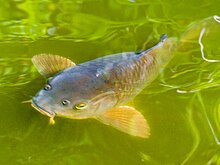Cyprinus rubrofuscus
| Cyprinus rubrofuscus | |
|---|---|

| |
| Scientific classification | |
| Domain: | Eukaryota |
| Kingdom: | Animalia |
| Phylum: | Chordata |
| Class: | Actinopterygii |
| Order: | Cypriniformes |
| Family: | Cyprinidae |
| Genus: | Cyprinus |
| Species: | C. rubrofuscus |
| Binomial name | |
| Cyprinus rubrofuscus Lacépède, 1803 | |
| Synonyms[1] | |
| |
Cyprinus rubrofuscus, the Amur carp, is a species of cyprinid fish, and is the wild form of the well-known koi. It is widespread in the fresh waters of eastern Asia, native to China, Korea, Russia, Vietnam and Laos from the Amur to Red River basins, and has also been introduced outside its native range.[1] It is known for its muddy flavor and boniness, hence, it is not commonly eaten by locals except when stewed.[2]
In the past, it was considered a subspecies of the common (or European) carp, often under the scientific name C. carpio haematopterus (a synonym), but the two differ in genetics[3][4] and meristics, leading recent authorities to recognize them as separate species.[1][2] Although earlier studies also have found minor differences between northern ("haematopterus") and southern ("viridiviolaceus") populations in Eastern Asia in both meristics[5] and genetics,[3] later studies have found that they are not monophyletic.[6] However, any phylogenetic structure is difficult to establish because of widespread translocations of carp between different regions.[6] The parent species of the domesticated koi carp is an East Asian carp, possibly C. rubrofuscus (not C. carpio).[7][8]
References
- ^ a b c d Huckstorf, V. (2012). "Cyprinus rubrofuscus". IUCN Red List of Threatened Species. 2012: e.T166052A1108337. doi:10.2305/IUCN.UK.2012-1.RLTS.T166052A1108337.en. Retrieved 12 November 2021.
- ^ a b Froese, Rainer; Pauly, Daniel (eds.). "Cyprinus rubrofuscus". FishBase. November 2016 version.
- ^ a b Zhou, J., Wu, Q., Wang, Z. and Ye, Y. (2004). Molecular Phylogenetics of Three Subspecies of Common carp Cyprinus Carpio, based on sequence analysis of cytochrome b and control region of mtDNA. Journal of Zoological Systematics and Evolutionary Research 42(4): 266–269.
- ^ Xu, P., Zhang, X., Wang, X., et al. (2014). Genome sequence and genetic diversity of the common carp, Cyprinus carpio. Nature Genetics 46: 1212–1219 doi:10.1038/ng.3098
- ^ Kirpitchnikov, V.S., and Billard, R. (1999). Genetics and Breeding of Common Carp. p. 5. INRA. ISBN 978-2-7380-0869-5
- ^ a b Wang, C., Liu, H., Liu, Z., Wang, J., Zou, J., and Li, X. (2010). Mitochondrial genetic diversity and gene flow of common carp from main river drainages in China. Freshwater Biology 55(9): 1905–1915.
- ^ Freyhof, J.; Kottelat, M. (2008). "Cyprinus carpio". IUCN Red List of Threatened Species. 2008: e.T6181A12559362. doi:10.2305/IUCN.UK.2008.RLTS.T6181A12559362.en. Retrieved 12 November 2021.
- ^ Craig, J.F., eds. (2015). Freshwater Fisheries Ecology. p. 297. Wiley-Blackwell. ISBN 978-1-118-39442-7.

